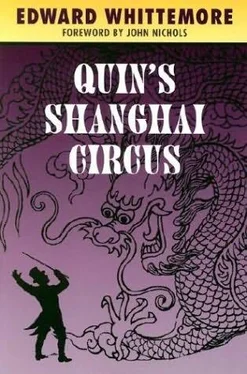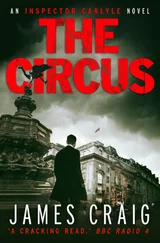Edward Whittemore - Quin’s Shanghai Circus
Здесь есть возможность читать онлайн «Edward Whittemore - Quin’s Shanghai Circus» весь текст электронной книги совершенно бесплатно (целиком полную версию без сокращений). В некоторых случаях можно слушать аудио, скачать через торрент в формате fb2 и присутствует краткое содержание. Жанр: Фэнтези, на английском языке. Описание произведения, (предисловие) а так же отзывы посетителей доступны на портале библиотеки ЛибКат.
- Название:Quin’s Shanghai Circus
- Автор:
- Жанр:
- Год:неизвестен
- ISBN:нет данных
- Рейтинг книги:3 / 5. Голосов: 1
-
Избранное:Добавить в избранное
- Отзывы:
-
Ваша оценка:
- 60
- 1
- 2
- 3
- 4
- 5
Quin’s Shanghai Circus: краткое содержание, описание и аннотация
Предлагаем к чтению аннотацию, описание, краткое содержание или предисловие (зависит от того, что написал сам автор книги «Quin’s Shanghai Circus»). Если вы не нашли необходимую информацию о книге — напишите в комментариях, мы постараемся отыскать её.
Quin’s Shanghai Circus — читать онлайн бесплатно полную книгу (весь текст) целиком
Ниже представлен текст книги, разбитый по страницам. Система сохранения места последней прочитанной страницы, позволяет с удобством читать онлайн бесплатно книгу «Quin’s Shanghai Circus», без необходимости каждый раз заново искать на чём Вы остановились. Поставьте закладку, и сможете в любой момент перейти на страницу, на которой закончили чтение.
Интервал:
Закладка:
Except for one man, one figure toiling through the last light of day. It is well after dark before he reaches the beach, before he stumbles across the sands and sits down by the water, the first time he has rested in many days. But now he does not rest. He lays his hands in his lap and bows his head, a small man invisible in the gloom facing a forest of masts.
In the deep of night a wind comes. The ships tug at their anchors and the wind shapes itself, grows in fury and in nightmare until it becomes the intolerable world given birth by one man’s mind.
In the morning the sky is clear, the horizon empty. Once more the sea is a desert. A divine wind, a kamikaze , has destroyed utterly the magnificent fleet of Kublai Khan and all his magnificent horsemen.
Years later Nichiren’s disciples ask him how they can ever explain such a miracle. They will not believe us, say the disciples.
No, they will not, answers Nichiren, but you must tell them the truth all the same. You must say that once a man dreamed a wind would come, he dreamed it and willed it, and because he did the wind came.
Winter, said Geraty. Last winter, perhaps?
The man in question is no longer young. In fact he’s old, he’s tired. He has bad habits and he’s poor. In the course of sixty-five years of lying and cheating and stealing he has accrued only two things of value, both gifts from the dragon. One is a small gold cross. The other is a collection of rare manuscripts in translation.
The cross was taken from a woman who was falling under its weight. That was in Shanghai before the war.
The collection of manuscripts he found in the Chinese wing of the warehouse where the Kempeitai kept its files. One night he organized a convoy of trucks to carry the manuscripts away for safekeeping, then he set fire to the wing. That was in Tokyo right after the war.
Let twenty years go by. Let them simply pass.
It is winter. Last winter or one like it. Our man puts two bottles of Irish whiskey in a valise and takes the train to Kamakura. He walks to a certain beach and sits down on the sand.
Why? To remember an evening long ago when he shared two bottles of Irish whiskey with a forgotten No actor? To recall the four people who once held a picnic on this beach?
Perhaps. In any case he sits down on the sand and opens the first bottle.
An hour goes by, or two hours, or less than an hour. Our man is watching the waves and takes no notice of time. From somewhere in the darkness a stranger appears and sits down. He accepts a drink, mutters, stares vacantly at the stars. After a while he begins to talk.
He mentions mulberry trees, pine groves, giant steps that lead nowhere, blackjacks and urinal candy, a face eaten by a dog, mushrooms, a night in Nanking.
Our man listens to this phantasmagoria and is appalled. For He hath scattered the proud in the conceit of their heart. Must the chaos of the world be infinite? Is this voice from the waves recounting a history of the twentieth century? The thirteenth century? A century that lies a million years in the past?
The stranger is a tiny man. Is it the movement of his hands? His eyes? The way he holds his head?
For some reason our man is reminded of the little woman in Shanghai. He thinks of her, and all at once he knows this little man and that little woman are related. Why? How? There’s no explanation, no way to comprehend it. They are, that’s all.
The stranger drinks, he talks, he stares at the stars. Just before dawn he falls asleep, naked except for a towel over his loins. It seems that as he talked he felt compelled to take off his clothes. Our man quietly gets to his feet and leaves, but not empty-handed. No, he takes the stranger’s greatcoat with him because he has made a decision. Two decisions.
First, he will take the collection of manuscripts to America and sell them for a large amount of money so that he can live his last days in peace.
Second, he will return the small gold cross to its rightful owner.
Both actions are for the same purpose. He wants to assure himself that the insane tale told by the stranger on the beach won’t end the way it began. He wants to prove to himself that even an account of history as grotesque as that can have some small measure of order behind it. Above all he wants to believe there has been some meaning in the pathetic parade of events and people he calls his life.
He acts. He goes to America and the collection is confiscated. It’s taken away from him but those who take it, who store it in a New York warehouse, don’t realize what they have is useless. Useless because he has kept the key, the code book to the annotations, the dragon’s secret, the keys to the kingdom.
Failure? No, total disaster. He’s sick and old and there’s no way he can support himself now. He came to New York thinking he was a rich man, rich at the end of life, but the rich He hath sent empty away.
Our man collapses in a hostel for vagrant alcoholics. Three days later he staggers north to return the small gold cross to its rightful owner. The day he arrives back in New York happens to be the feast day of the saint for whom his mother is named, Brigid. He goes back to the neighborhood where he grew up. He staggers into the bar once owned by and named for his father, another Eddy, like all bartenders a profane confessor. After rolling the dice he boards a freighter and returns to Japan. In his pocket is the secret code book, all he has left.
Summer.
A summer evening. Last summer or one like it. Drunk, dazed from horseradish, our man finds himself lying on his back in a vacant lot in Tokyo, in a slum, on sand that is damp because he has come to rest in a gigantic urinal along with other scavenging alcoholics. The men in the urinal are dying, they’re all dying, and before the night is over they’ll be robbed of all they have. What else can he do but sleep and forget? He sleeps.
Sleeps and snores and raves, for of course he can’t forget yet, the time hasn’t come, he must sink lower still. While he sleeps fitfully a horde of faces hovers over him, crowds around him in the urinal. All the experiences he has known in forty years in the Orient come back to him.
In his dream he begins to visit these people, apparently to renew old friendships and share a mild anecdote or two in order to recall the nostalgia of other days, actually to beg something from them that will keep him alive.
For now it’s come down to that. He has no excuse for living anymore. Either he finds an excuse or he’s finished.
He makes a list and starts at the top of the list. That night and every night over the summer he lies on the damp sand of the urinal working his way down the list of names and faces’ When he meets one of these people he smiles pleasantly. He nods at their eccentricities, ingratiates himself in whatever manner seems appropriate, apologizes, agrees enthusiastically with everything they have ever done.
He flatters them, admires them, mentions their goodness and their strength, their tenderness, their humility. He invokes the saints in praise of them. He grins. He wrings his hands hopefully.
Thinking it might amuse them, he shuffles his feet in a little dance. He asks for pity, begs for it.
He gets down on his knees and cries, sobs, admits to all acts real and imagined. He takes off his clothes and displays himself naked so they will see he is hiding nothing. He covers his face with his hands and peeks between the fingers.
Ridiculous. Is anyone going to be fooled by this absurd performance?
Of course not. There’s no chance of it and he knows it, but he does it anyway because his pride is gone. Gone. He’s desperate to find an excuse for living.
He snatches up the articles they discard. No matter how worthless they are, he snatches them up and presses them to his chest, clutches them, squeezes them with his thumbs, licks them, wets them with his tears, buries them in his greatcoat.
Читать дальшеИнтервал:
Закладка:
Похожие книги на «Quin’s Shanghai Circus»
Представляем Вашему вниманию похожие книги на «Quin’s Shanghai Circus» списком для выбора. Мы отобрали схожую по названию и смыслу литературу в надежде предоставить читателям больше вариантов отыскать новые, интересные, ещё непрочитанные произведения.
Обсуждение, отзывы о книге «Quin’s Shanghai Circus» и просто собственные мнения читателей. Оставьте ваши комментарии, напишите, что Вы думаете о произведении, его смысле или главных героях. Укажите что конкретно понравилось, а что нет, и почему Вы так считаете.












